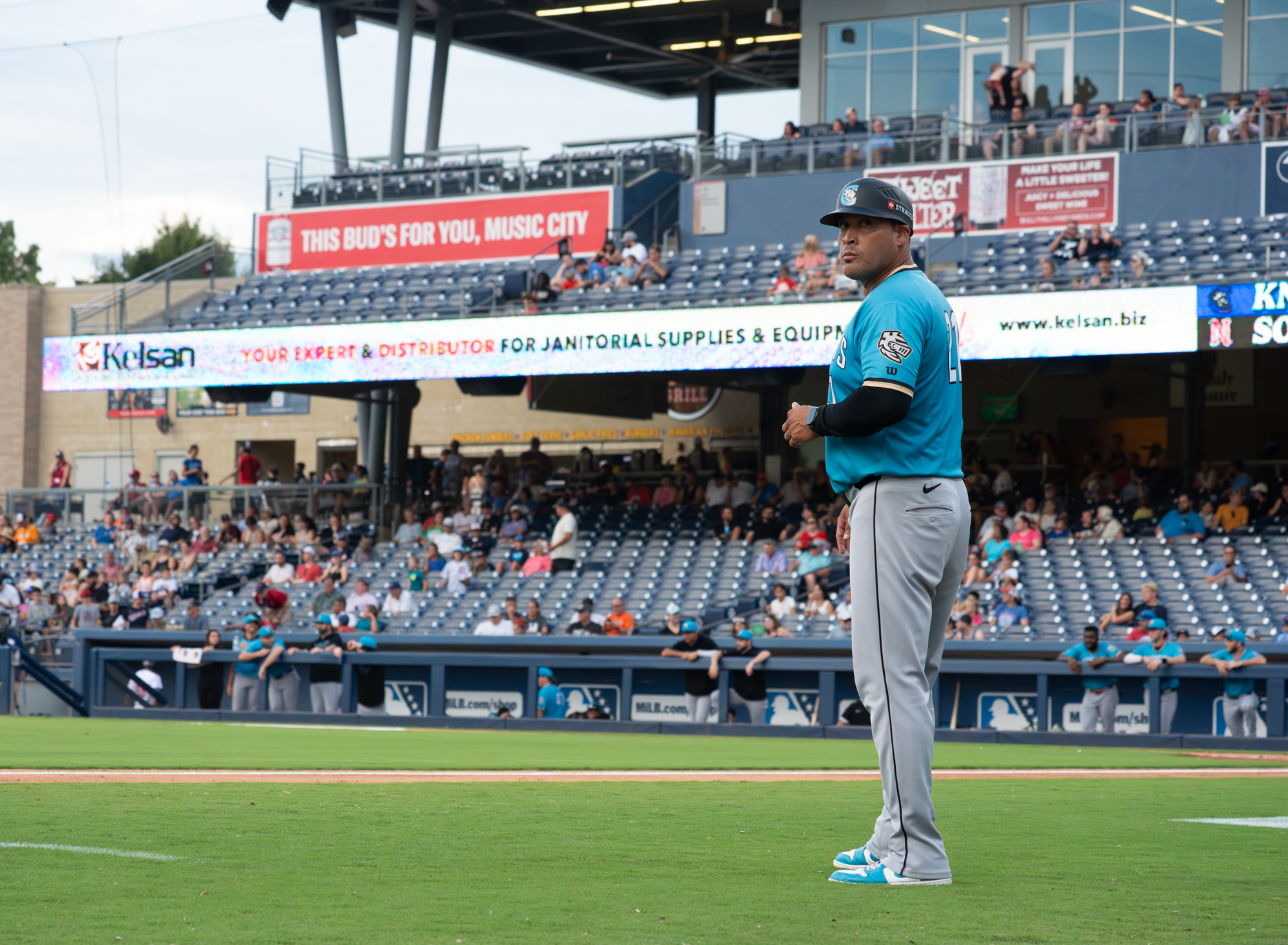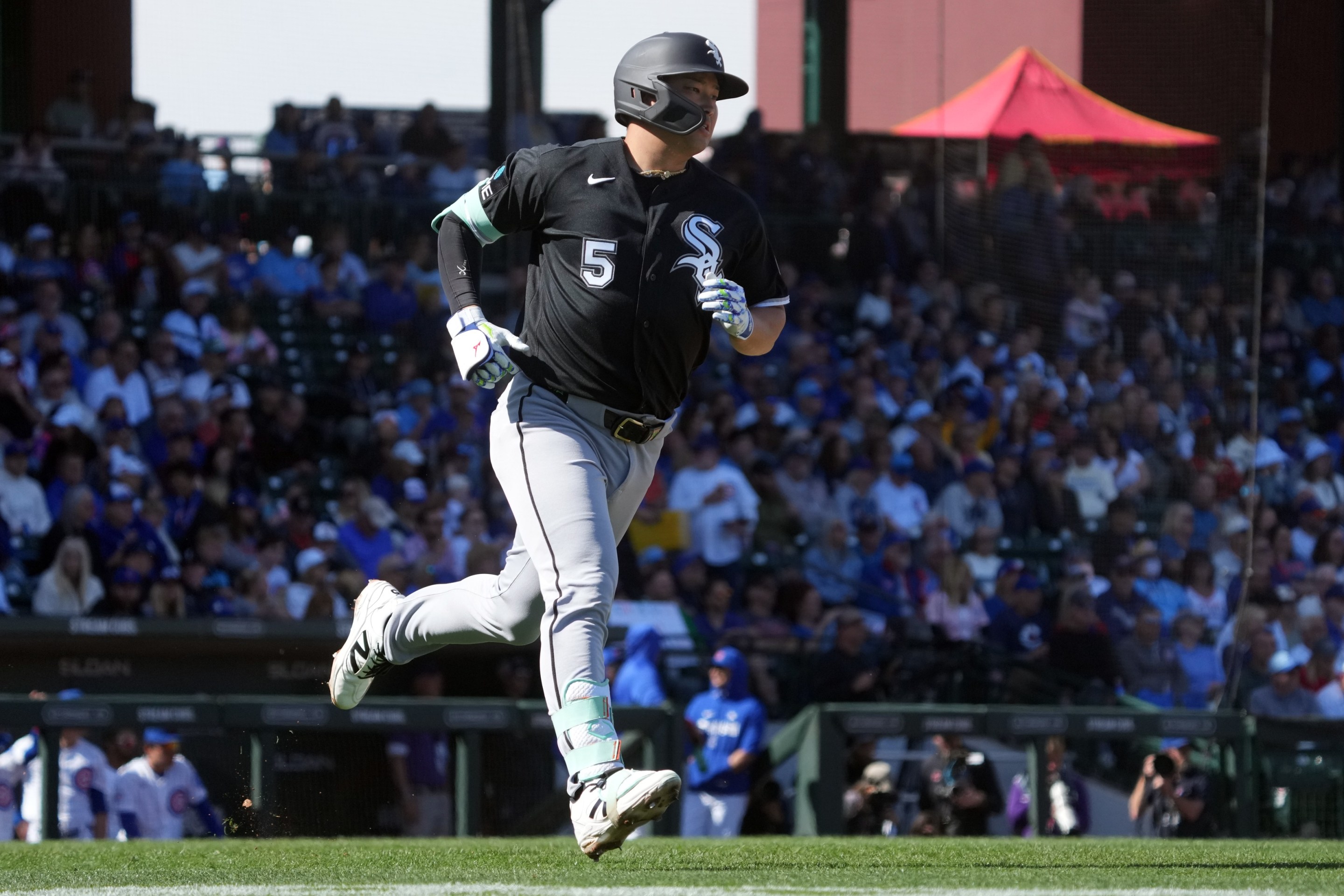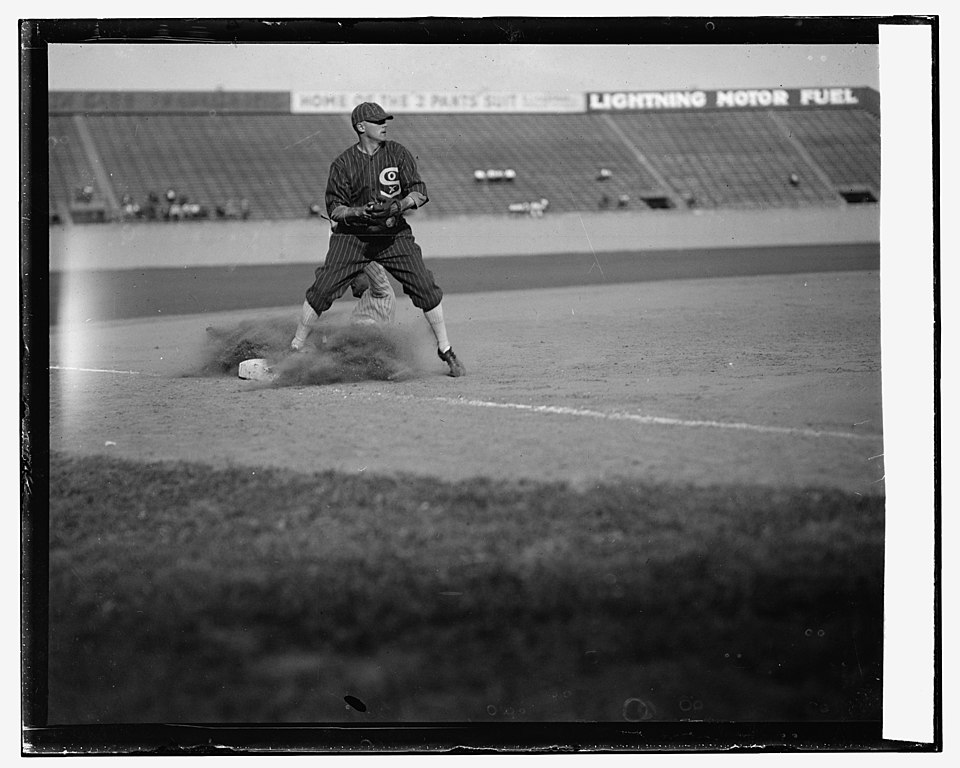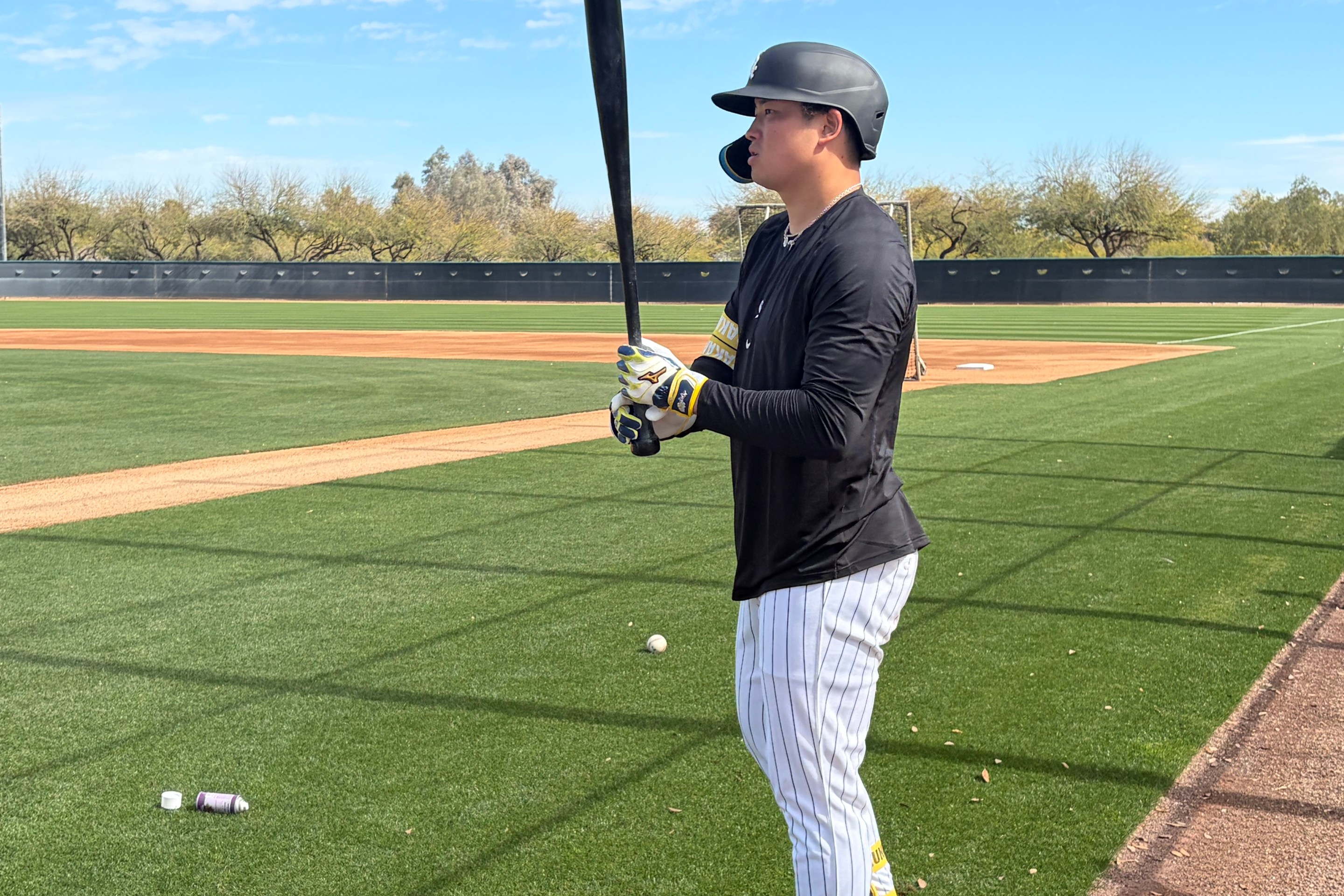When I spoke to Sergio Santos in his first month as the manager of the Birmingham Barons last year, he said that his experience as a minor league shortstop and a major league reliever gave him a useful perspective on reaching his whole roster.
"I've been that everyday player, every single day, to being a relief pitcher ... I feel like the guys know it. I can have a pitcher ask me a question, I can have an infielder, hitters ask me questions. Through 16 years of pro ball, there's a vast amount of experience that I do have, lessons of things I did the right way and things I did the wrong way, where if I can save them from making the same mistake, it's a win."
This came to mind when thinking about Colson Montgomery's early-season spiraling. Montgomery was repeating Triple-A, yet getting further away from resembling a major-league hitter, and he was playing for a guy who spent four years hitting his head against the ceiling at Triple-A before taking up the White Sox on their offer to try pitching.
Was this experience useful in helping Montgomery through a 41-percent strikeout rate and a sabbatical in Arizona?
"1,000 percent," Santos said. "I couldn't help but see the direct correlations of what I was. I mean, just talent-wise, speed, power, good defense, all of it, and just the inconsistency that I had, and I think it was because my thoughts weren't always productive and positive, right? Like it was always what's ahead, what's ahead, what's ahead, putting all this pressure on yourself, everybody's expecting me to do this.
"And so luckily, I saw the path Colson was in, or where it could have led, because I lived it. But just the teachings of stoicism, how I hold that so dear, and just instilling that in him. And it's funny, man, it's like I hear interviews that he does, and it's a lot of stuff that I've been harping on for a really long time. So it's awesome that it's stuck, but more importantly, that he's applying it in a more positive way."
Santos saw the decision to reset at Camelback Ranch as a major inflection point in Montgomery's career.
"I said, listen, this can go one of two ways," Santos recalled. "You go down there feeling sorry for yourself, thinking 'This is bullshit, I don't want to be doing this,' you're going to waste two weeks and you're not going to get anything out of it.
"Or, you can really go down there, focus, with a plan, with a mission. And if you do that, it'll feel like the step backwards for the two big strides forward. To his credit him, [hitting director Ryan] Fuller, they went down there, they got after it, and he's been a whole different guy since he came back."
At the time I talked to Santos on Saturday, the White Sox had scored 61 runs over the first seven games of the second half, with many of the players he managed in Charlotte leading the way.
"The Charlotte Knights are taking care of business up there," Santos beamed.
"Triple-A, being that level where we've always said it -- we want to win, we want to compete, but at the end of the day, especially at this level, especially the team that I had to break the season with, I knew all five or six of those [players], if I did my job right, they would be prepared to play in the big leagues.
"It has nothing to do with how well they do, how many hits they get. It's just, if Will Venable calls me and goes, 'Man, these guys are well prepared and ready to play in the big leagues,' I feel like myself and our staff did a really good job."
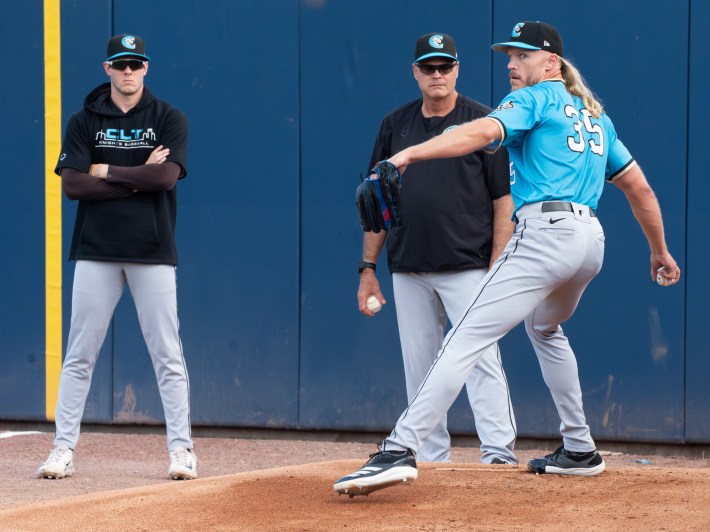
Scott Aldred on the Charlotte Knights staff
As farm director Paul Janish told it when the White Sox unveiled their player development staff back in January, Scott Aldred saw the Charlotte pitching coach job as an exciting opportunity to get back into back into a uniformed role after spending five years as the Marlins' pitching coordinator.
"I think we're benefiting from the fact that he's in a spot where he wants to be back at an affiliate, and have a pitching staff," Janish said of Aldred. "Being transparent, he's excited about kind of where we are. We have a lot of good arms coming through the organization that are kind of on the cusp of the major leagues or some of them have already been in the big leagues. That was really appealing to him."
Then spring rolled around the White Sox lost nearly that entire layer of pitching -- Drew Thorpe, Ky Bush, Mason Adams, Juan Carela -- to Tommy John surgery, throwing the Triple-A rotation into a week-to-week concern from Opening Day onward.
"Yeah, it's been different, right?" Aldred said. "When you have injuries, you gotta fill those holes somehow."
But Aldred said the roster hasn't been devoid of talented arms, even if one of the recent examples is also on the injured list with a less severe issue. Let's run through Aldred's read on said pitchers, starting with that one.
Noah Schultz
Schultz is currently out with a knee issue, and Santos said he expects the left-hander to be back on a mound after 3-4 weeks. Aldred outlined the game plan for his return, which will feature less of the pitch that Schultz and Brian Bannister have tagged with throwing off his mechanics.
"When he comes back, it's going to be sinker, a sprinkle of four-seam, focus on the slider and the changeup, and keep the cutter on the back burner."
Peyton Pallette
Pallette extended his streak of scoreless outings to seven with a pair of innings on Saturday, and the sharp uptick in his performance traces back to when he started featuring his curveball as his go-to secondary offering.
"His curveball, when he's flipping it right, is a major league pitch," Aldred said. "He got off it a little bit and wasn't throwing it for a good amount of strikes. I think we're on the right path with it.
"We got the changeup back involved, which has been real positive for him recently. When he got sent here the first time, the changeup was a little off. We went to work on that, and sometimes you spend x amount of time on a single pitch and you lose the other ones a little bit along the way."
The improvement also comes with a reduction of fastballs, from 55 percent over his first nine games to 46 percent since, which is another part of the plan.
"There's three pillars to a heater: movement, velocity and command. If he can get two of the three..." Aldred said. "He's got the velocity. The movement profile's not perfect. However, if we can chase down a little better command, we can get it to play better."
Jairo Iriarte
Montgomery wasn't the only Charlotte Knight who took a break to make some fixes in Arizona, as Jairo Iriarte spent more than a month working on mechanics.
"That was just shortening the arm stroke a little bit, getting rid of some of the length on the back side, keep it behind the back hip, more toward second base as opposed to wrapping a little bit and getting out toward first base," Aldred said.
Iriarte's work has been in pursuit of restoring his fastball life, and returning to Charlotte in a relief role was intended to let him attack first and worry about inefficiency second. It's been successful in terms of run prevention -- 18 IP, 10 H, 4 R, 4 ER, 9 BB, 22 K over 15 appearances -- but Aldred is on the lookout for any resurfacing of bad habits.
"He's had his moments where it's been good," Aldred said. "I just noticed recently he's getting a little more length, so kinda reset him a little bit and see if we can a little shorter path back there."
Wikelman González
Outside of an outing where he gave up six runs over two-thirds of an inning to Memphis before the All-Star break, González has largely been succeeding at the task of hand (two-inning relief appearances), even if the peripherals fail to inspire confidence. He's walked 21 batters against 23 strikeouts over 26⅔ innings with the Knights around a couple of call-ups to the White Sox bullpen.
"I think the walks are going to go away. They have recently been better," Aldred said. "The stuff's good. He needs reps. [...]
"We've been working on the changeup and the sweeper at the same time, and that's not always easy working on two pitches, but he's doing well with both of them. He continues to make good progress."
Noah Syndergaard
Syndergaard made his Charlotte debut on Wednesday, allowing five runs on five hits (three homers) over four innings, with a fastball that averaged a hair under 92 mph.
"I think physically, he's fine, I don't think he's moving like he used to," Aldred said. "We looked at some stuff from '19, and we'll see what we can do to get on track fast. [...]
"I think there's a little more velocity in the tank. Right now he's running a little underpowered because he's not using his body great. I'm going to start there and see where it goes."
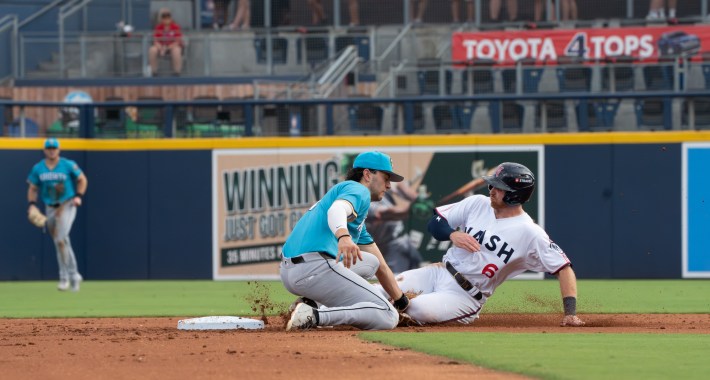
Margalus / Sox Machine)
Jacob Gonzalez takes next step
While dropping in on the Barons for the Rickwood Classic back in June, I asked Ryan Galanie and Guillermo Quiroz about the lack of power in the Southern League. Both had an array of theories -- big arms, better defenses, bigger ballparks, heavy air -- but neither had a conclusive reason for why slugging and scoring was down across the league.
With former first-round pick Jacob Gonzalez promoted to Nashville for the last two games of the Charlotte Knights' series against the Sounds, he gave my survey an n of 3.
"Good pitching," Gonzalez started. "It's hard to get homers on one side of the [field]. Like, Knoxville, big park. Birmingham, big park. Rocket City is pretty good, I would say it plays normal. Chattanooga plays normal.
"But I would say pitching's been pretty good, there's good bullpen arms, good starters."
Gonzalez finished the Birmingham portion of his season hitting .244/.305/.369. Superficially that's uninspiring, yet good enough to lead Barons regulars in isolated power (.125 ISO), and by a healthy margin (Galanie is second at .107). In lieu of results, Gonzalez learned to measure his contact quality by other standards.
"If I hit a ball, especially in Birmingham, if I hit a ball, double, I'm like, 'All right, that's pretty good.' If you're hitting doubles, that's still good. You just look when you get your report app here, and you see, 'Oh, it was hit pretty good, probably be a homer at other places."
Otherwise, Gonzalez says he's more or less settled into the version of the hitter that he described to James back in June: somebody trying to do damage early in counts before ditching the small leg kick with two strikes.
"Especially at the start of the year, I was trying to get away from the two-strike approach, hoping that my bat-to-ball (skills) would just take over, and you still try to do damage with two strikes," Gonzalez said.
"Which, I'm still trying to do damage, just in a different way. Just going to hit the ball 5 miles per hour softer, which is still fine. Ninety-five to 100 is still good."
White Sox Minor Keys
DSL White Sox 2, DSL Giants Black 0 (7 innings)
- Frank Mieses went 1-for-3 with a double and a strikeout.
- Jose Mendoza was 0-for-3.
- Alejandro Cruz, Eduardo Herrera and Yordani Soto all were 0-for-2 with a strikeout.
- Diego Perez: 3 IP, 4 H, 0 R, 1 BB, 1 K, 1 WP, 1 HBP
